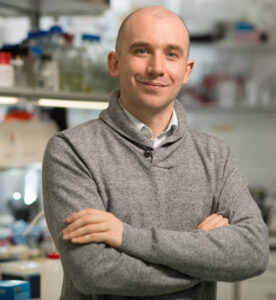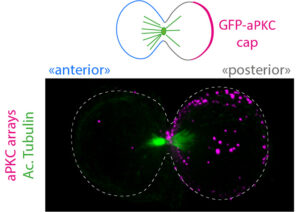We are delighted to announce the winner of the 2024 Hooke Medal is…
Emmanuel Derivery

credits “MRC Laboratory of Molecular Biology”
Emmanuel has been a Group Leader at the LMB since 2016. His research focus is asymmetric cell division, whereby the cellular contents of mother cells is distributed unequally between two daughter cells, allowing them to adopt different cell fates. This is the hallmark of stem cells, in which one daughter cell specialises to perform a specific function, while the other becomes another stem cell which retains the ability to divide. His group seeks to better understand the molecular mechanisms by which cell fate determinants segregate asymmetrically during this division.
Emmanuel’s group combines state-of-the-art, quantitative imaging in developing flies and mammalian cells with in vitro reconstruction using purified proteins, with an emphasis on technology development. Ultimately, they seek to determine how polarity signals are ‘written’ onto the mother cell’s cytoskeleton, and how these signals are in turn ‘read’ by molecular motors to carry cell fate determinants into only one daughter cells, allowing them to adopt different cell fates. In recent research, Emmanuel’s group in collaboration with the lab of David Baker in University of Washington, has developed a method based on de-novo protein design to directly untangle the contribution of signalling pathways involved in asymmetric cell division. In collaboration with John O’Neill’s group also in the LMB’s Cell Biology Division, discovered a mechanism by which cells ensure an optimal balance of water for biochemical reactions and protein function.
technology development. Ultimately, they seek to determine how polarity signals are ‘written’ onto the mother cell’s cytoskeleton, and how these signals are in turn ‘read’ by molecular motors to carry cell fate determinants into only one daughter cells, allowing them to adopt different cell fates. In recent research, Emmanuel’s group in collaboration with the lab of David Baker in University of Washington, has developed a method based on de-novo protein design to directly untangle the contribution of signalling pathways involved in asymmetric cell division. In collaboration with John O’Neill’s group also in the LMB’s Cell Biology Division, discovered a mechanism by which cells ensure an optimal balance of water for biochemical reactions and protein function.
Prior to joining the LMB, Emmanuel was a Human Frontier Science Program postdoctoral fellow at the University of Geneva, Switzerland. He studied Molecular and Cell Biology at the ENS Lyon, France and received a Ph.D. from the University Paris-Sud, France.
Emmanuel is the fourth LMB Group Leader to win the Hooke Medal, following Andrew Carter, Anne Bertolotti and Ben Nichols.
Emmanuel will be awarded the Hooke Medal and give a talk about his research during the 90th Harden Conference joint BSCB/Biochemical Society co-organised meeting cell migration meeting which will be held on 15-18 April 2024 at Birmingham, UK
You can follow Emmanuel’s lab here.
What is the Hooke medal?
The Hooke Medal is awarded every year by the BSCB and recognises an emerging leader in cell biology. The award is named after Robert Hooke, the eminent 17th century natural philosopher and author of Micrographia (the world’s first comprehensive illustrated book on microscopy) and is given to an individual who has made an outstanding contribution to UK Cell Biology – until we extended the period of eligibility in May 2014 this has usually been within the first 10 years of establishing their own lab. The medal is presented annually at the annual BSCB meeting after which the winner delivers their research talk.
The medal shows Robert Hooke’s microscope and the cork cells he first described. It was designed by Dr Brad Amos.
Since 2015, the Hooke Medal has been awarded to a cell biologist who started their own group within the last 14 years (with allowances for legitimate career breaks).
